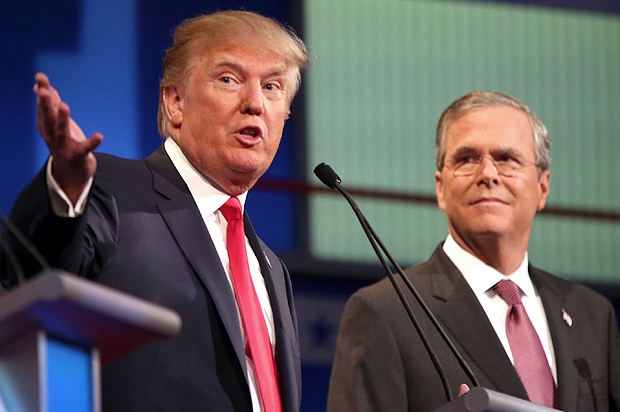Two weeks ago, about one month after Donald Trump captured the lead in the race for the Republican presidential nomination, the chief strategist for Jeb Bush’s super PAC was remarkably sanguine about the real estate mogul’s surge.
“If other campaigns wish that we’re going to uncork money on Donald Trump, they’ll be disappointed,” Mike Murphy, the top strategist for the pro-Bush “Right to Rise” PAC, told the Washington Post. “Trump is, frankly, other people’s problem. We’d be happy to have a two-way race with Trump in the end, and we have every confidence that Governor Bush would beat him.”
Murphy had better be careful what he wishes for. The latest national polls show that even if the 17-candidate GOP field winnows down to the staid Bush and the brash Trump, Bush starts out at a decided disadvantage.
The latest comes from Monmouth University, which released a poll today that found Trump thumping the former Florida governor in a head-to-head contest, taking 56 percent of the vote to Bush’s 37 percent. Underscoring the GOP electorate’s disgust with so-called establishment politicians, Monmouth found that the candidates who performed best against Trump were former Hewlett Packard CEO Carly Fiorina, who trailed 37 percent to 50 percent; Texas Sen. Ted Cruz, who lagged Trump 41 percent to 48 percent; and neurosurgeon-turned-conservative activist Ben Carson, who actually led Trump 55 percent to 36 percent. Of those three, only Cruz has ever held elected office.
Those findings mesh with a Public Policy Polling survey released Tuesday, which showed Bush losing badly to Trump in a two-way contest, winning just 34 percent of the GOP vote to Trump’s 59 percent. Once again, only Carson topped Trump.
To be sure, nominees are selected via state-by-state primaries and caucuses, so national head-to-head polls are of only limited utility. What’s more, living in a post-Citizens United world means that even long-shot candidates will be able to keep their candidacies afloat thanks to the generosity of just one or two billionaires; there are approximately zero plausible scenarios in which the GOP contest rapidly becomes mano-a-mano.
But that’s not to say national head-to-heads are useless. For starters, they’re a gauge of candidates’ relative standing in the party, and they provide a sense of the contenders’ fundamental strengths and weaknesses. And the numbers don’t reflect well on Bush’s sagging candidacy. Sure, all candidates except Carson currently trail Trump in head-to-heads, but none trail quite as badly as Bush. In the PPP poll, Trump led the other candidates matched against him by an average of less than 5.8 points, compared to a 25-point lead over Bush. The Monmouth numbers tell a similar story: Trump leads non-Jeb Republicans by 13.7 points, but he leads Jeb by 19 points. Trump’s large lead over some candidates — like his 62 percent-29 percent spread over Ohio Gov. John Kasich — can be attributed in part to his rivals’ lower name recognition; Bush has no such excuse.
Instead, Republican voters simply aren’t enamored of the Bush clan’s third would-be president. PPP found that only 39 percent of GOP primary voters view Bush favorably, compared with 42 percent who see him unfavorably; only also-ran Chris Christie fared worse. Trump, once wildly unpopular among Republican primary voters, easily bests Bush on favorability, with a 56 percent favorable/30 percent unfavorable spread.
That helps explain why Bush is taking a different tack than his super PAC strategist suggested last month. Now in third place nationally (where he polls in just the single digits, according to Real Clear Politics’ polling average) Bush can ill-afford to ignore Trump, so he’s now in full attack mode, depicting the frontrunner as a “soft-on-crime” liberal in conservative clothing. But as Joan Walsh argued this week, it’s hard to see how Bush wins an insult war with Trump. And while it’s certainly possible that Trump will fade as more conservative voters learn of his past liberal positions, Trump has spent the past three months defying the laws of political gravity, continuing his ascent after charging that Mexico was sending “rapists” to the U.S., smearing John McCain’s war service, and suggesting that Megyn Kelly was menstruating during last month’s GOP presidential debate.
But even assuming the attacks on Trump eventually do him in, it’s far from clear that Bush will be the beneficiary. Trump may have his own past heresies, but the reason so many conservatives loathe Bush is because he still bucks the right wing on cultural touchstones like immigration and Common Core. Meanwhile, Marco Rubio has had his own tensions with the conservative base, but unlike his erstwhile mentor, he’s largely overcome them; in the PPP his 58 percent-24 percent favorable/unfavorable spread is bested only by Ben Carson, who’s far less likely to survive the intensifying scrutiny that comes with surging poll numbers.
In the final analysis, Jeb Bush has lots of money behind him. It’s far too soon to count him out. But as Jim Newell astutely posited yesterday, Bush is looking more and more like an overcapitalized start-up — hubris included.


